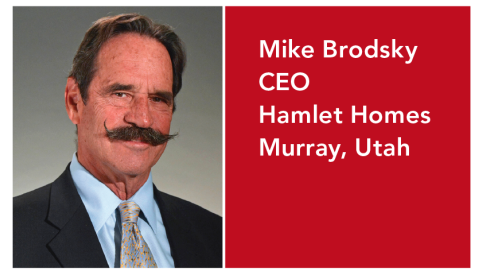There are two things that matter in a successful business: marketing and innovation. Both marketing and innovation produce results; all the rest are costs.
If you don't believe me, do a little snooping. I think you'll find that marketing has lost its relevance. You'll also find that marketers have lost their influence.
The decline of marketing has been slow, consistent and almost predictable. Blame it all on strategy — or the lack of it. There doesn't seem to be much difference between the phrase "marketing promotion" and "marketing strategy." Commoditization, market fragmentation and customer expectations are probably the culprits behind this trend, but that's just scratching the surface.
In the past, commoditization wasn't that much of a problem. Quality and service innovations made differentiation simple; because it was easy to be different, it was easy to market. Now the opposite is true.
From the customer's point of view, it's hard to tell one builder from another. To make things worse, most home builders can't tell the difference either. That's both good news and bad news. As far as a solution, it leaves only one answer: Differentiate or die.
If you want to be different, you need to reinvent your marketing and innovation strategies. To begin this process, marketers and CEOs need to see eye to eye.
Recapturing TrustFor many CEOs marketing has become a department, or worse yet, a department that spends a lot of money. Who can blame the CEOs for feeling that way? Most marketing programs don't generate a CEO's trust and confidence. Let me show you why.
At any one time, a CEO may have two or three major initiatives on his plate. He's focusing on things like shorter cycle times, better scheduling, improved service, lower costs, better quality, higher satisfaction and more focused communications.
Marketers have a different set of priorities. Marketers focus on creating new campaigns, developing brochures, redesigning collateral material, landscaping model homes, setting up sales offices and generating more traffic. Their meetings bring them together with advertising agencies, merchandisers, landscapers and architects.
Compare marketers and CEOs and it's easy to see why each says of the other, "They don't get it."
For marketers to add value to the organization, they need to get on the CEO's agenda. To get on the agenda, marketers, and marketing departments, must become the following:
- More strategic.
- More cross functional.
- More bottom line oriented.
Marketers need to become visionary, responsible and accountable.
I want you to think about your company. Most of all, ask yourself a couple of tough questions:
- Do you have specific performance goals (market share, customer satisfaction, relative product quality, etc) for your marketing department?
- Do you tie your marketing objectives to a financial scorecard (cost per sale, cost per visitor, profit per series. etc)?
- Do you have a written strategy (Premium customer, core position, value proposition, etc)?
Most builders believe they can say, "Yes, Yes and Yes." The sad truth is, their customers have already answered for them. They answer when they say, "Which one were you? And, by the way, tell me about your incentives?"
I Know, I Know ...If you had the chance to sit and talk with Philip Kotler — considered to be the father of modern marketing — he'd tell you, "Marketing's basic mission is to create differences between what your company is offering and what your competition is offering." He'd finish by saying that each point of difference doesn't need to be important to everyone; it only needs to be important to your company's premium customer (customers that will respond best to your strengths).
As many times as I scream, "differentiation," builders scream, "I know, I know." But most builders don't know. They have a problem with marketing because they don't know who they are. If you don't know who you are, it's pretty tough to plan a marketing strategy.
All Builders Look the SameMarketing is much more than the traditional product, price, place and promotion tactics developed in the 1960s. Sure, the four P's get a lot of lip service, but how many of the P's do builders really end up using? I can answer that question. Just one: promotion. And there's a reason.
Marketers and CEOs don't ever seem to be on the same page. On one hand, marketers believe advertising, merchandising, collateral material and special events are the answers to generating sales and solving problems if sales are slow. This causes them to spend their time with the promotion tactic of the four P's. Marketers complain if the price is too high and the place isn't right.
On the other hand, CEOs are flying at a different altitude. They believe that the combination of quality, cost and price are the tools most responsible for selling homes and solving sales velocity problems. And they end up overseeing other departments as they do marketing's job and develop the product, price and place parts of the four P's. Guess what happens when things don't work and sales don't meet budgets? If you said, "Sales incentives and promotions," you're right.
Promotions, in the form of price reductions and incentives, are the industry's answer to poor marketing. Actually, the chain of events happens like this. Land is purchased and a product is designed. Budgets are developed and based on what the company needs to sell. Next, advertising, collateral and merchandising are designed to bring anybody and everybody. And finally, price incentives are used when sales don't match budgets. Am I being too tough? I don't think so.
In the home building industry, a price discount equals strategy. And there's a simple reason why this happens. From the customer's point of view, all the builders look the same. Blame poor marketing again.
Reinventing MarketingBoth marketers and CEOs are going need to work together if they want any chance of reinventing their revenues and profits. CEOs will need to quit telling marketing what needs to be sold and start listening to them about what can be sold. And they need to quit believing that marketing is selling. Finally, they need to make sure marketers oversee each of the four P's, not just one of them.
Marketers need to move beyond the classic skill of market research, advertising and sales promotions (grand openings, radio remotes, etc) and become proficient in positioning, brand building, experiential (experience) marketing, profitability analysis, target pricing and question based selling. These are the tools that will end up separating the companies that struggle from those that don't.
Advertisement
Related Stories
Hamlet Homes' Mike Brodsky on Finding Successors and Letting Go
A transition that involved a national executive search, an employee buyout, and Builder 20 group mentorship to save the deal
Time-Machine Lessons
We ask custom builders: If you could redo your first house or revisit the first years of running your business, what would you do differently?
Back Story: Green Gables Opens Up Every Aspect of its Design/Build Process to Clients
"You never want to get to the next phase and realize somebody's not happy."






